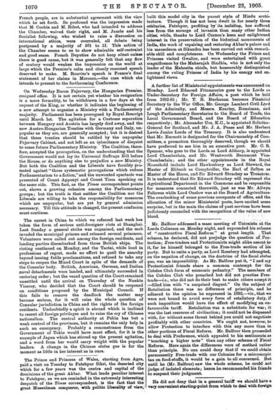On Wednesday Baron Fejervary, the Hungarian Premier, resigned office. It
is not certain yet whether his resignation is a mere formality, to be withdrawn in a few days at the request of the King, or whether it indicates the beginning of a new attempt to organise a Ministry with a Parliamentary majority. Parliament has been prorogued by Royal Rescript until March 1st. The agitation for a Customs separation between Hungary and Austria has largely died away, and the new Austro-Hungarian Treaties with Germany and Italy, un- popular as they are, are generally accepted; but it is desired that these treaties should be ratified by the unpopular Fejervary Cabinet, and not left as an inheritance of disquiet to some future Parliamentary Ministry. The Coalition, there- fore, accepted the prorogation, on the understanding that the Government would not lay its Universal Suffrage Bill before the House, or do anything else to prejudice a new Ministry. But both the Coalition and the Liberals have forcibly pro- tested against "those systematic prorogations which reduce Parliamentarism to a fiction," and the unwonted spectacle was presented of Count Apponyi and Count Tisza speaking on the same side. This fact, as the Times correspondent points out, shows a growing cohesion among the Parliamentary groups ; but the truth is that neither the Coalition nor the Liberals are willing to take the responsibility for measures which are unpopular, but are yet by general admission necessary. Till this attitude is changed, the present confusion. must continue.






































 Previous page
Previous page